How Small and Medium size Businesses Can Attract Top Talent: Insights from Olga Fedoseeva, Founder of UnitiQ
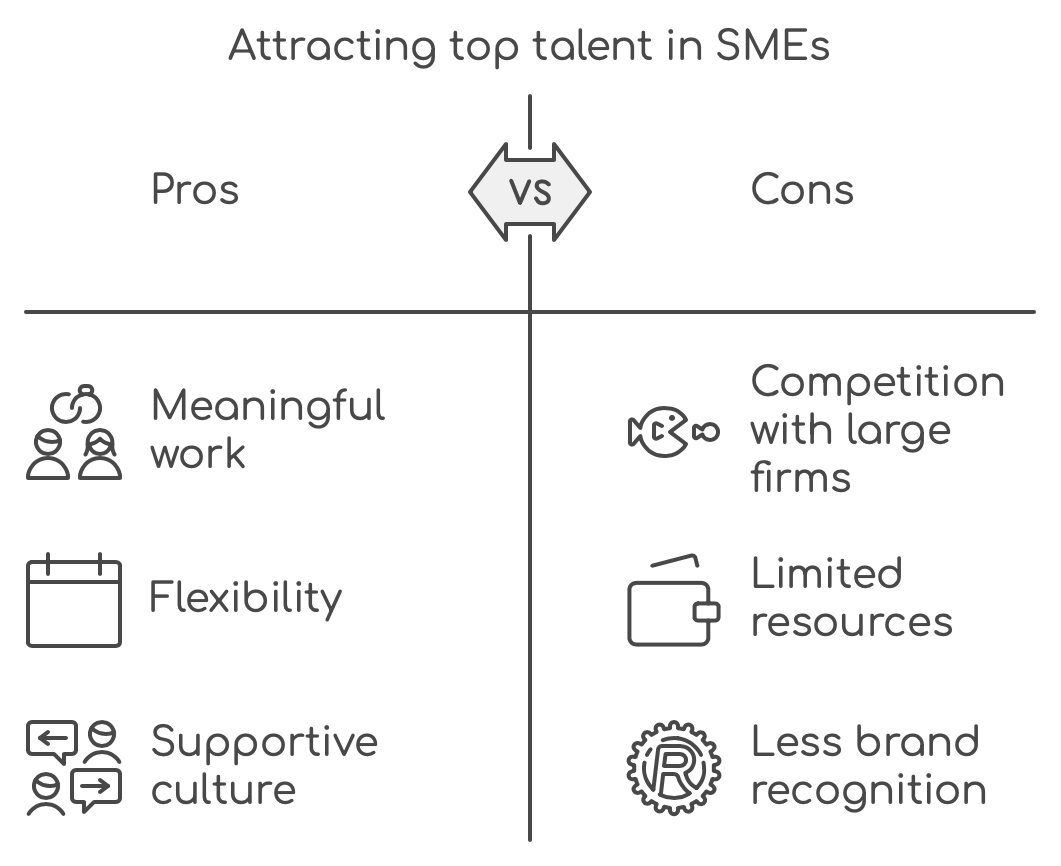
As the founder of UnitiQ, a fractional HR service provider for SMEs, I’ve had the privilege of working with many small businesses that face the challenge of competing with larger corporations to attract the best talent. Over the years, I’ve seen firsthand how small and medium-sized businesses can successfully bring in top-tier employees by focusing on what they do best: offering meaningful work, flexibility, and a supportive company culture. Here's what I've learned from my work with SMEs and how they can compete for top talent. I also recommend you to read our article - Attracting the Right Talent to Your Small Business: 5 Key Strategies
Offering Exciting and Impactful Projects
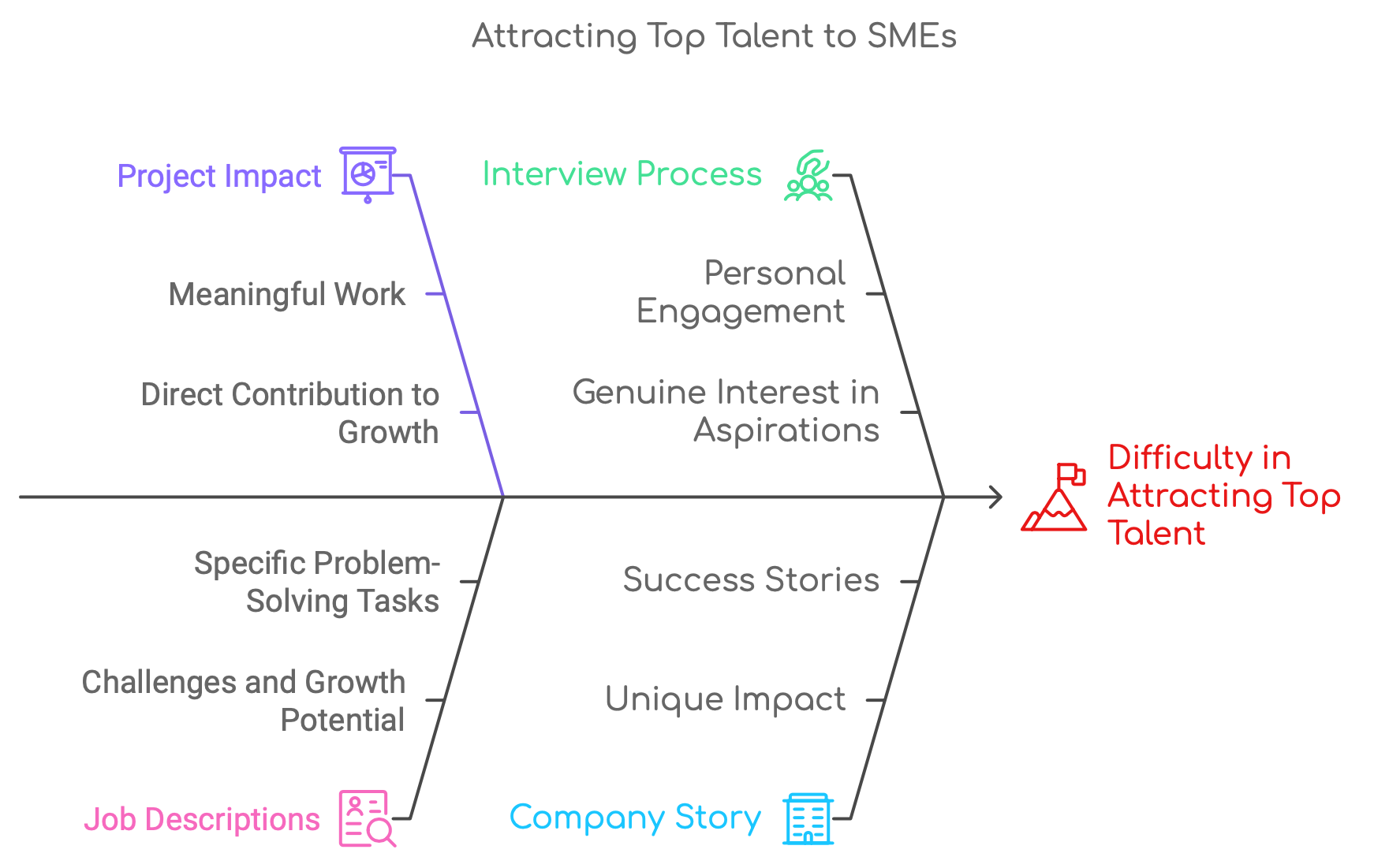
One of the key reasons talented professionals choose to work for SMEs, as I’ve observed with my clients, is the opportunity to work on projects that truly make a difference. Unlike larger corporations where employees often feel like a cog in a machine, small businesses provide their teams with the chance to have a direct impact on the company’s growth and success.
For instance, one of our clients, a tech startup, was able to attract a highly skilled software engineer not because they offered the highest salary, but because they promised him the chance to lead product development from the ground up. The engineer wanted ownership and creative freedom, which is something SMEs can often provide better than large corporations.
Here’s how SMEs can use exciting projects to their advantage:
🤩 Tell Your Company’s Story: When crafting job ads or company profiles, focus on the unique impact employees can make at your business. Highlight the kinds of projects they’ll be working on, and share success stories of previous employees who have made a real difference. Candidates want to know that their work will be valued and meaningful.
🧐 Design Job Descriptions Around Challenges: When describing a role, don’t just list tasks—talk about the challenges they’ll help solve and the potential for growth. I always advise SMEs to be specific about the kinds of problems new hires will tackle. This approach appeals to candidates who are motivated by problem-solving and impact.
🤗 Make Interviews Personal and Engaging: In my experience, one of the biggest turn-offs for candidates is a cold, transactional interview process. As a small business, you have the advantage of creating a more personal experience. Show genuine interest in the candidate’s aspirations, and explain how their role will fit into the larger business picture. When candidates feel like they’ll be more than just a number, they’re much more likely to choose you over a corporate job.
👍 Read our article about Transparency in Hiring: Beyond Salary Ranges and Job Descriptions
🧐 Design Job Descriptions Around Challenges: When describing a role, don’t just list tasks—talk about the challenges they’ll help solve and the potential for growth. I always advise SMEs to be specific about the kinds of problems new hires will tackle. This approach appeals to candidates who are motivated by problem-solving and impact.
🤗 Make Interviews Personal and Engaging: In my experience, one of the biggest turn-offs for candidates is a cold, transactional interview process. As a small business, you have the advantage of creating a more personal experience. Show genuine interest in the candidate’s aspirations, and explain how their role will fit into the larger business picture. When candidates feel like they’ll be more than just a number, they’re much more likely to choose you over a corporate job.
👍 Read our article about Transparency in Hiring: Beyond Salary Ranges and Job Descriptions
Flexibility as a Competitive Edge
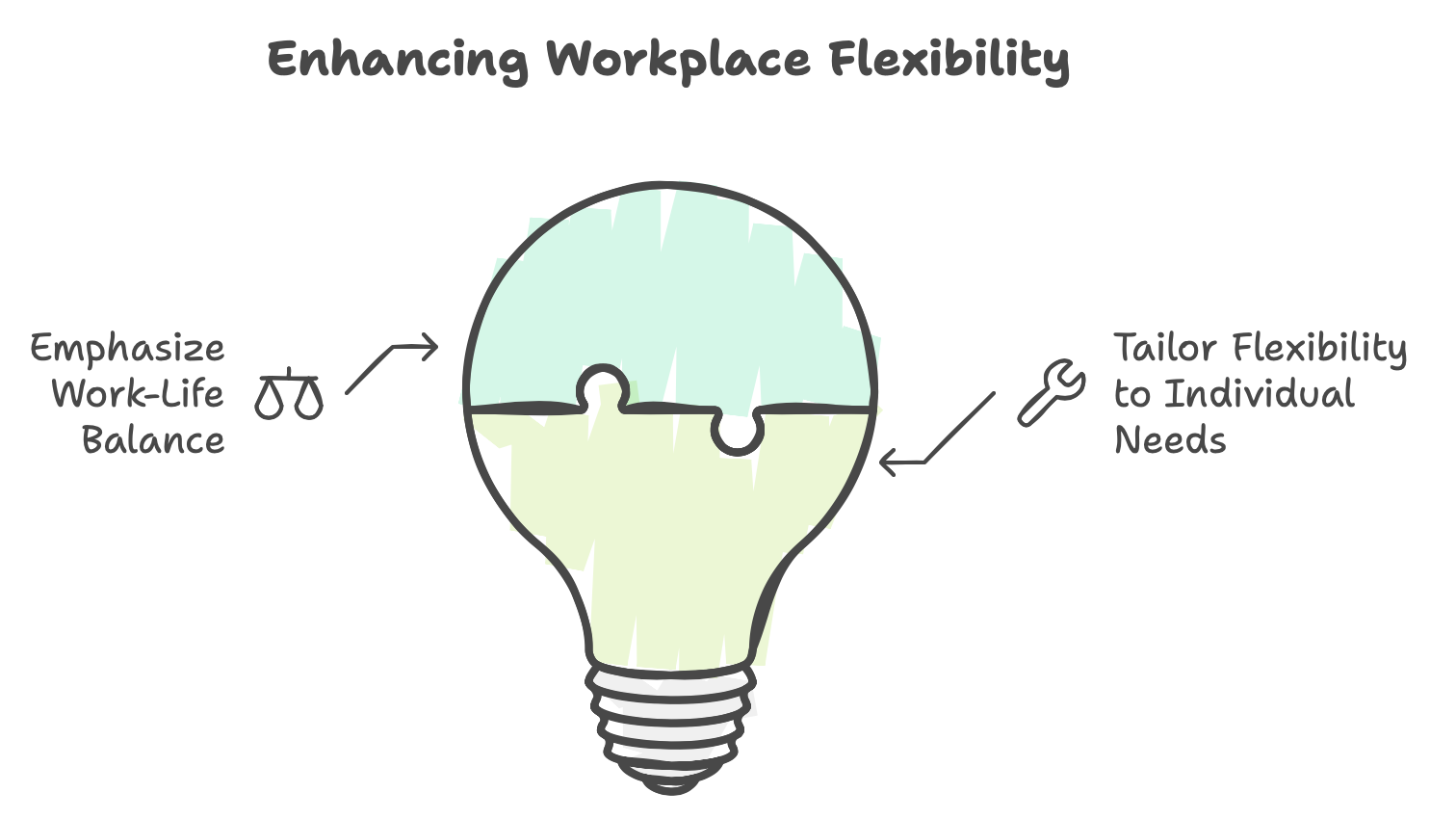
Flexibility is something many SMEs are well-positioned to offer, and it’s increasingly becoming a top priority for employees. Over 50% of candidates I’ve spoken with value flexibility as much, if not more, than salary. In a world where work-life balance is paramount, offering flexible hours or remote work options can be a game-changer.
Read a case study about how UnitiQ implements Flexible Schedules and Increased Hiring and Retention of Top Talents: How Fractional HR and Flexible Work Schedules Enhanced Talent Acquisition at Charge
One of our clients, a small consulting firm, found that offering flexible working hours helped them recruit highly qualified professionals who were also balancing family responsibilities. By allowing employees to work from home a few days a week or set their own hours, they were able to attract top talent who would have otherwise gone to larger firms with stricter policies.
Here’s how flexibility can work in your favor:
- Emphasize Work-Life Balance: When I advise SMEs on recruitment, I always stress the importance of promoting work-life balance as part of their employer brand. Whether it’s offering flexible hours, the option to work remotely, or providing generous vacation policies, these perks are highly valued by today’s workforce.
- Tailor Flexibility to Individual Needs: As a small business, you have the ability to be nimble and responsive to your employees’ needs. One of our clients had a working mother on their team who needed to start her workday later to drop her kids off at school. By accommodating her schedule, they not only improved her productivity but also gained her loyalty. Flexibility like this can make a huge difference in attracting and retaining talent.
Creating a Strong Sense of Value and Recognition
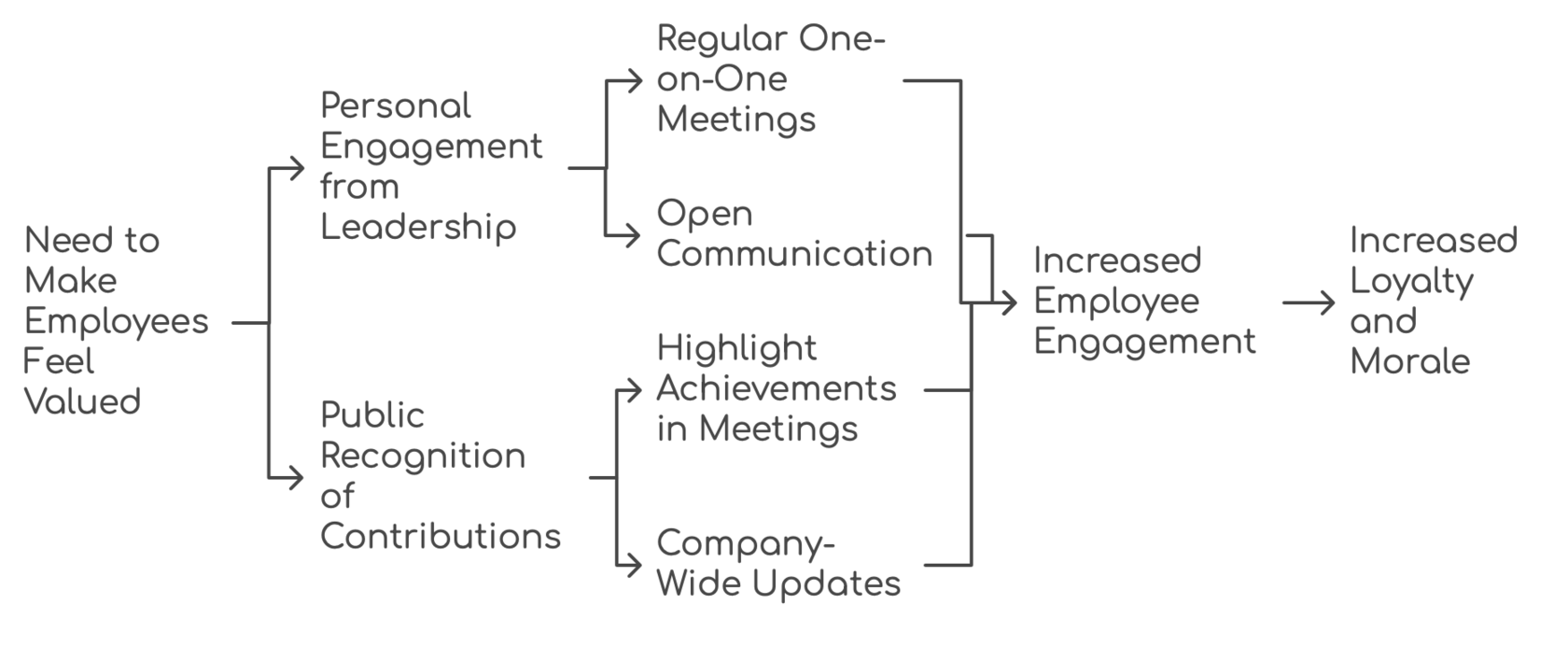
Another insight from working with SMEs is the importance of making employees feel valued. In small companies, each individual’s contributions are more visible, and employees often have a greater sense of ownership over their work. When employees feel that their efforts directly impact the business, they tend to be more engaged and loyal.
One client, a manufacturing firm with fewer than 50 employees, had a simple but effective approach: regular one-on-one meetings between the owner and each employee. These check-ins allowed employees to voice their concerns, receive personalized feedback, and understand how their work contributed to the company’s success. This personal connection is something large corporations struggle to replicate, and it’s a key advantage for SMEs.
To foster this sense of value:
Personal Engagement from Leadership: As a business owner or manager, take the time to engage with your employees on a personal level. Regular one-on-one meetings and open lines of communication can make employees feel like their voices are heard and that they’re an essential part of the business.
Public Recognition of Contributions: During team meetings or company-wide updates, take the time to highlight individual achievements and the positive impact each person has had. In my experience, this goes a long way in building morale and creating a sense of community. When employees feel recognized, they’re more likely to recommend your company to their network.
Public Recognition of Contributions: During team meetings or company-wide updates, take the time to highlight individual achievements and the positive impact each person has had. In my experience, this goes a long way in building morale and creating a sense of community. When employees feel recognized, they’re more likely to recommend your company to their network.
Fostering a Supportive Company Culture
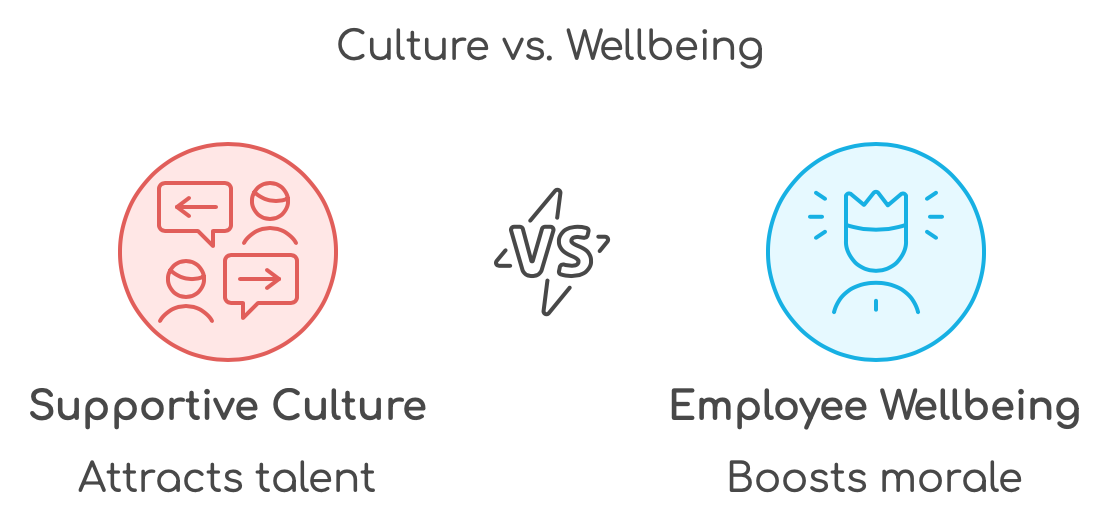
Lastly, one of the most powerful tools in an SME’s recruitment arsenal is a supportive and close-knit company culture. In a smaller team, it’s easier to create a positive atmosphere where everyone feels connected and aligned toward a common goal.
For example, one of our clients, a small marketing agency, worked hard to cultivate a culture of respect, collaboration, and mutual support. They organized regular team-building activities and celebrated both individual and team successes. As a result, their employees felt a strong sense of belonging and loyalty, which made it easier for them to attract like-minded candidates.
Here’s how you can strengthen your company culture:
Encourage Open Communication: Foster an environment where employees feel comfortable sharing their ideas and feedback. In smaller teams, it’s easier to create this kind of transparency, and it helps build trust among employees.
Support Employee Wellbeing: Show that you care about your team’s health and wellbeing, both inside and outside of work. One client of ours offered regular wellness checkups and even organized team yoga sessions during lunch breaks. Small gestures like this help create a sense of community and demonstrate that you care about your employees as people, not just workers.
Support Employee Wellbeing: Show that you care about your team’s health and wellbeing, both inside and outside of work. One client of ours offered regular wellness checkups and even organized team yoga sessions during lunch breaks. Small gestures like this help create a sense of community and demonstrate that you care about your employees as people, not just workers.
Polling Employees for Insights
One strategy I’ve found effective, both at UnitiQ and with my clients, is polling existing employees to understand what they value most about working for the company. It’s a simple but powerful way to gather real insights that can help shape recruitment efforts. When you know why your current employees are happy, you can highlight those same strengths in job listings. For example, one client discovered that their team valued the clean, organized work environment and fair pay—factors they hadn’t initially thought to mention in job ads. By including these details in their job postings, they were able to attract candidates who appreciated those same values. Keep in mind that Hierarchial structures prevent honest feedback from employees. How to overcome it?
My Thoughts
Small businesses have a unique advantage in today’s talent market. Through my experience at UnitiQ, I’ve seen how offering meaningful projects, flexibility, and a strong sense of recognition can be far more valuable to employees than the highest paycheck. SMEs have the ability to create a more personalized and engaging work environment, which not only attracts top talent but also helps retain them for the long term. By playing to these strengths, small businesses can compete with even the largest corporations when it comes to hiring the best people.
I also recommend you to read:
Ambience is crucial for productivity, what are the reasons?
Smart hiring metrics as a part of talent acquisition process
Why hiring right people can't work without clear and explained culture
I also recommend you to read:
Ambience is crucial for productivity, what are the reasons?
Smart hiring metrics as a part of talent acquisition process
Why hiring right people can't work without clear and explained culture
We help to Arrange Your Hiring Process
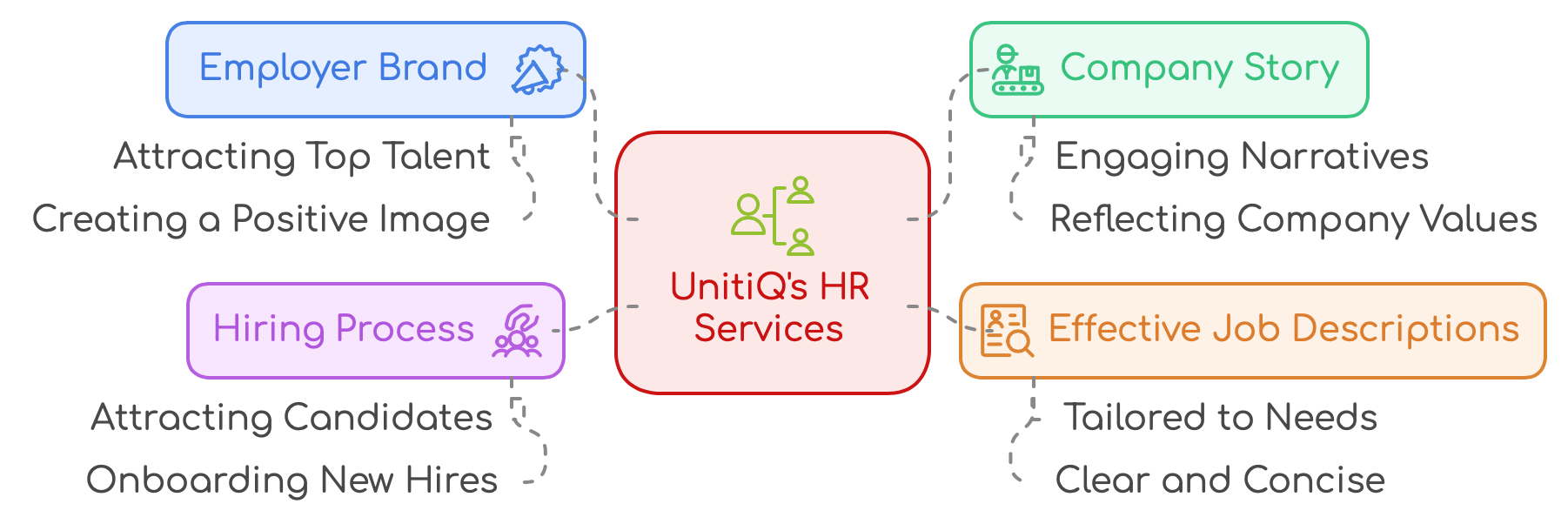
At UnitiQ, we specialize in helping growing and scaling businesses lay a solid foundation for attracting top talent. We work closely with you to build a strong employer brand, craft a compelling company story, and ensure your business stands out to prospective employees. Our team also assists hiring managers in writing effective job descriptions tailored to your unique needs and helps streamline the entire hiring process, from attracting candidates to onboarding new hires. Learn about advantages of Fractional HR Services.
Contact me today for a free consultation, and let’s work together to set your business up for long-term success!
My Telegram
My LinkedIn
Contact me today for a free consultation, and let’s work together to set your business up for long-term success!
My Telegram
My LinkedIn








